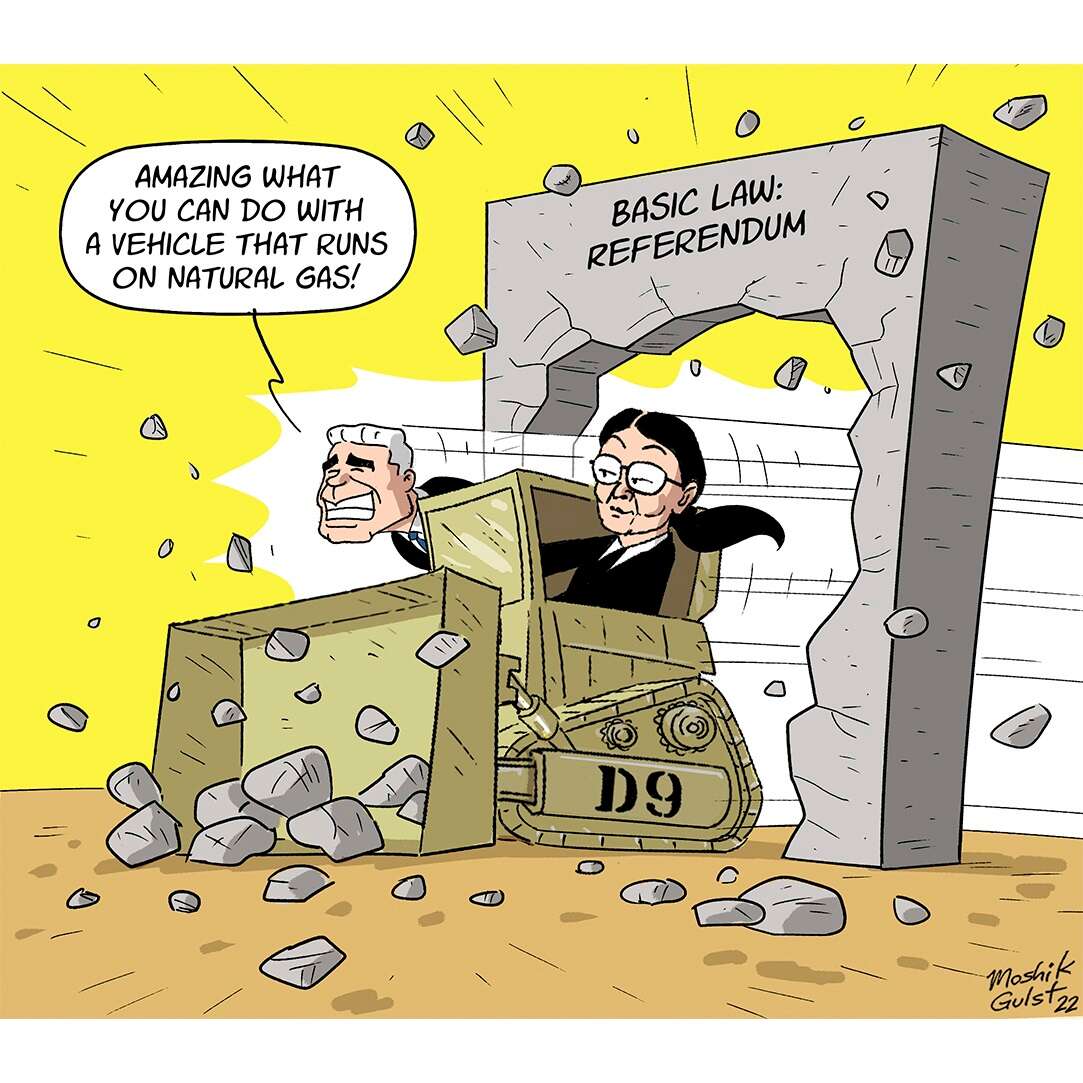Jewish Life Is Cheap
For the past five years, the dominant media narrative about race—perhaps the dominant media narrative, period—has built up a hierarchy of racial justice. At the top are the perennially marginalized “BIPOCs,” victim to the lash of the ever-present colonial whip. At the bottom lurks the “white male,” inherently and ineluctably racist, even when (or perhaps especially when) they’re trying hard not to be.Ben-Dror Yemini: How academia omits facts to make Palestinians the perpetual victim
In a manner true to our history, Jews have been sucked into this Manichean whirlpool, cast by radical academics and their media acolytes as an essential, almost distilled element of the global system of racial oppression. We are not just white; we are the plotters and financiers of the entire sysyetm of white supremacy.
Worse still, if Jews are white then they are not, well, Jews. The largely successful effort to assign Jews to the white race means Jews do not have the moral privilege of determining our own identity. The perverse result of dispossessing Jews of their own history is that it grants the mantle of Jewishness to our enemies. Thus Ye, in the same Twitter thread where he threatened to go “death con 3” on Jews, also claimed: “I actually can’t be antisemitic because Black people are actually Jew also.”
When Whoopi Goldberg asserted on The View that the “Holocaust was not about race,” she was advancing a version of the same arguments made by virulent Black Hebrew Israelite hate preachers, professors who insist on the indelible whiteness of Jews, and anti-Zionists who deny the legitimacy of Jewish historical identity. It’s true that only the last two groups tend to have their ideas promoted by the media, but all three share the idea that “Jew” is not a meaningful or legitimate category. Palestinians can be Jews—thus the Democratic political activist and Louis Farrakhan fan Linda Sarsour is invited to participate as an expert in a prominent panel on antisemitism. And by the same logic, Black Hebrews can be Jews. Ye can be a Jew. Only Jews are not allowed to be Jews.
Over and over, Jews have watched this trend play out, and largely we’ve been silent.
In a key scene in the 2014 Oscar-nominated Selma, Dr. Martin Luther King Jr. leads a group of activists and protesters across a bridge alongside Black civil rights leaders. Not pictured in the scene was a man who walked in that front line of protesters, fighting for civil rights: the great American Jewish rabbi and leader Abraham Joshua Heschel.
Why would Ava Duvernay, the film’s director, compromise the film’s historical integrity to erase one of America’s most prominent Jewish spiritual figures out of the image? The answer is that over the past decade, the anti-racist movement that has been the media’s single most championed social cause has turned a syllogism into a truism: Whites are by definition white supremacists; Jews are the whitest of whites because they falsely hide behind their fake ethnicity; Jews, therefore, are at the top of the white supremacy totem.
The media has actively spread these ideas by turning woke racialism into the defining moral cause of our time, while at the same time ignoring the consequences of this campaign. While Ye was “canceled” for making open threats and affirming his love for Hitler, little more than a week earlier hundreds of Black Hebrew Israelites marched through central Brooklyn, uniformed and in formation, chanting “we are the real Jews.” Save for some coverage in the New York Post and in Tablet’s daily newsletter, The Scroll, the rest of the media was virtually silent. The media is still talking about the alt-right’s 2017 hate march in Charlottesville, treating it as one of the defining events of the modern era, but when hundreds of virulent antisemites march in Brooklyn—the mecca of America’s media establishment—it was crickets. The silence was appalling but also unsurprising given that the same media has largely ignored the routine violent attacks against religious Jews in New York.
Recently, Prof. Shay Hezkani claimed in an article he wrote for “Haaretz” newspaper that I misled my readers when I wrote that the Jewish community in Mandatory Palestine faced an existential threat in 1947 and 1948.Hadley Freeman: It sucks to be a Jew on the left
I challenge Hezkani to an intellectual debate. I am even willing to provide him here with some of the arguments at my disposal - shall he answer my call.
“Every week Ben-Dror Yemini tells readers of ‘Yedioth Ahronoth’ about Arab leaders in 1947 who called to throw the Jews into the sea, planning to systematically murder them,” Hezkani wrote in his Haaretz column last week.
“Throughout 15 years of my research, looking into hundreds of propaganda pieces from 1947-1949, I ran into only one case in which Hassan al-Banna - founder of the Muslim Brotherhood – mentions the ‘sea’ and ‘Jews’ in the same sentence - while calling to expel the Jews from Egypt,” Hezkani wrote.
“The quote [used by Yemini and attributed to ex-Secretary General of the Arab League in Abdul Rahman Hassan Azzam] is not backed by credible sources in Arabic, and it’s unclear whether or not it was actually ever said.”
I read the Haaretz article and could not believe my eyes. In the book I published titled “Industry of Lies,” I presented a more detailed list of threats made against the Jews, with credible sources, during that time period.
But, Hezkani looked into hundreds of documents and somehow found nothing. It’s a little weird that I did not spent 15 years researching this topic in an academic setting, yet found so much more information. To clear all doubts, prior to publishing the research-backed chapters of my book, they were reviewed by three prominent academics.
It could be that Hezkani has difficulty reading books. So, let’s start with the leader of the Palestinian Arabs, Hajj Amin al-Husseini, who in 1941 arrived at Nazi Germany and called to kill every Jew, before returning to lead the Palestinians.
If Hezkani believes that al-Husseini had changed his mind later on, he should refer us to the relevant sources. In an interview to the “Al Sarih” newspaper, al-Husseini said the Arab goal during the 1948 War of Independence wasn’t to undo the UN Partition Plan for Palestine, but to “continue to fight until the Zionists are dead.”
As Hadley Freeman leaves the Guardian for the Sunday Times, she opens up about her Jewish experienceA rock star channels Jewish outrage at antisemitism
Honestly, what a dumpster fire that whole period was, to the point that it’s almost hard to remember what actually happened. But just off the top of my head, here is a list of things I remember lefty non-Jews saying to me back then:
1. “I don’t think you should write about antisemitism because you obviously feel very passionately about it.”
2. “What, exactly, are Jews afraid of here? It’s not like Corbyn is going to bring back pogroms.”
3. “Jews have always voted right so of course, they don’t like Corbyn.”
4. “It’s not that I don’t believe that you think he’s antisemitic. It’s just I think you’re being manipulated by bad-faith actors. So let me explain why you’re wrong…”
5. “Come on, you don’t really think he really hates Jews.”
All of the above were said to me by progressive people, people who would proudly describe themselves as anti-racism campaigners. And yet. When Jews expressed distress at, say, Corbyn describing Hamas as “friends”, or attending a wreath-laying ceremony for the killers at the Munich Olympics, or bemoaning the lack of English irony among Zionists, we were fobbed off with snarky tweets and shrugged shoulders.
What we were seeing, they said, we were not actually seeing. You could not design an exercise more perfectly structured to cause madness. It was, to be blunt, gaslighting.
Anyway, that’s all in the past now, right? Well it is for me, because I’m walking away. A lot of illusions were broken, and I lost a lot of respect for a lot of people I thought I knew, but it turned out I didn’t. Not really. Not at all. So I have left the garden. And it feels bloody great. (h/t messy57)
The antisemitic utterances of Kyrie Irving and Ye (formerly Kanye West) prompted condemnations from many celebrities, both those with Jewish backgrounds and those who weren’t Jewish but who issued solemn pledges of support for their Jewish friends and colleagues. Oscar-winning actress Reese Witherspoon went as far as to tweet, “This is a very scary time,” to which one follower chimed in with an anti-Israel rejoinder.
Solemnity, however, unexpectedly yielded to outrage at the annual Rock and Roll Hall of Fame induction ceremony in Los Angeles. What was no doubt expected to be one of the evening’s least momentous junctures, the honoring of lawyer-agent Allen Grubman, turned into a consciousness-raising session when rock star John Mellencamp took the stage for a profanity-laden introduction speech.
“Allen is Jewish, and I bring that up for one reason,” Mellencamp said. “I’m a gentile, and my life has been enriched by countless Jewish people.”
Mellencamp then turned it up a notch. “I cannot tell you how f***ing important it is to speak out if you’re an artist against antisemitism,” he continued. “Here’s the trick: Silence is complicity. I’m standing here tonight loudly and proudly with Allen, his family and all of my Jewish friends and all of the Jewish people of the world. F*** antisemitism!”
Whoa.
What was surprising about Mellencamp’s speech was not his principled stance, but the sheer indignation and the unbottled emotion that gave voice to it. For millions of Jews who have fearfully observed the growing normalization of antisemitic motifs in today’s popular culture, such a righteous outburst was surely a welcome surprise, but it begged a question for the entertainment industry: “Where have you been until now?”





























